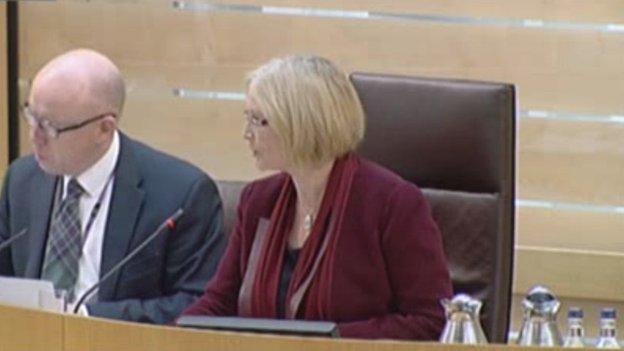Settle down? Not a chance
- Published
Politics is somewhat tapsalteerie - and understandably so - as a consequence of the referendum.
Customarily, in August, our MSPs would be absorbing the delights of the Festival or their constituency or Benidorm, according to whimsy.
But instead today they were participating in the final bout of questions to the first minister in this decidedly truncated off-peak session.
All changed, changed utterly. The voters, of course, will determine subsequently whether the prospectus on offer is terrible or imbued with beauty.
However, amid this political turmoil, some things remain steadfast. Some things do not change.
One is the disinclination of Holyrood's Presiding Officer to endure rannygazoo of any kind.
Extensive answer
Today, with some justification, she appeared to feel that sundry individuals were about to start something. Up with this she will not put.
And so Tricia Marwick advised Labour's Johann Lamont in blunt terms: "Ms Lamont, this is your last question. Would you just get to it?"
Looking a little less than gruntled, Ms Lamont got to it.
Up stepped the first minister - with an extensive answer which ranged from oil economics to the NHS to alleged Tammany Hall practices among his opponents.
It was all too much for the PO. Literally. "Can we get a conclusion, first minister?", she inquired wearily.
Well, of course, a conclusion there will be. Sometime in the early hours of September 19 after the people of Scotland deliver their verdict.

Holyrood Presiding Officer Tricia Mawrick ordered MSPs to "settle down"
And what might influence that conclusion? The economy, of course.
Today the talk was of one aspect of the economy: North Sea oil.
In particular, the exchanges were influenced by the intervention of Sir Ian Wood, a highly significant and successful figure in oil.
If Sir Ian were not so personally modest, one might call him an "oil baron". However, that would instantly conjure up images of J.R. Ewing and the like.
Sir Ian has decidedly more probity - and thus widespread respect. More Deeside than Dallas.
Wherein lay Mr Salmond's problem today.
Sir Ian had said that the FM had substantially over-estimated the volume and tax value of remaining North Sea reserves. How to respond?
Mr Salmond could not play the man. He could not castigate Sir Ian directly, having earlier praised him in other circumstances.
Commanding respect
But the FM was not stumped. Indeed, despite the conundrum, he was notably assertive. Perhaps I should say "because of" rather than "despite".
Mr Salmond frequently seems to thrive on challenge.
So today he stressed that Sir Ian was a figure who commanded the utmost respect. He did not quite call him "an honourable man". Too Roman.
But he indicated that other views are also available. In particular, he drew upon Professor Alex Kemp of Aberdeen University who has suggested that fields yet to be exploited may enhance the riches of the North Sea still further.
Further, Mr Salmond argued that - even at Sir Ian's estimate - some 15 billion barrels of oil or so was a decent settlement.
Other countries, he said, would surrender their eye teeth for such a dowry.
Resorting to satire, he depicted Scotland as a "poor benighted country", burdened with oil wealth.

The main topic of debate in the chamber was inspired by Sir Ian Wood's remarks
Ms Lamont was unimpressed. Scotland was not benighted. Rather it was a "wonderful country" which deserved better from its leaders.
Sir Ian, she implied, had ca'd the feet from the independence argument.
For the Tories, Ruth Davidson piled in too. Mr Salmond, she said, had "twisted facts" and "closed his ears" to the facts of oil production. It was declining, rapidly.
Cue outrage and barracking. As Mr Salmond attempted to answer, Nicola Sturgeon in particular could be discerned, actively heckling the Tory chief.
I heard the word "rubbish" and "you want to talk us down" among the vigorous contribution.
In the chair, Ms Marwick became restless once more. "Settle down", she said, part soothing, mostly strident.
Mr Salmond persisted, recalling that in the 1970s there had been a civil service report which had suggested that, with control of oil, an independent Scotland would have gained untold riches.
Untold, the FM noted, in that the report stayed secret for 30 years.
Which brought those particular exchanges to a close. Leaving no time for Mr Salmond's critics to deliver the familiar argument to the effect that Scotland must deal now with contemporary circumstances in the North Sea and elsewhere.
Settle down? With respect, presiding officer, not a chance.